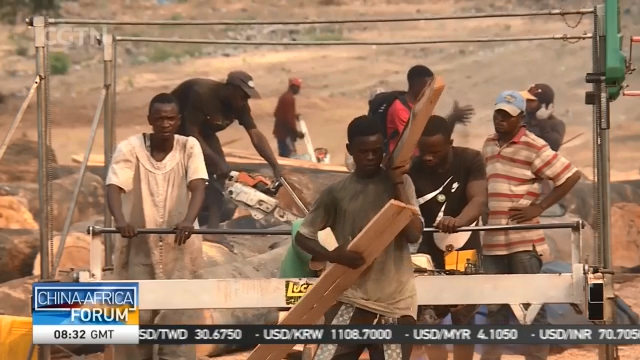
19:05, 30-Aug-2018
Capital on the Road: Congo's timber industry supports thousands of citizens
Updated
18:35, 02-Sep-2018
02:17

The Democratic Republic of Congo holds the largest portion of the Congo forest in central Africa. Its timber industry provides sustenance to thousands of its citizens. CGTN's Chris Ocamringa has a report.
Timber dealers are busy sawing logs on the outskirts of the DRC capital Kinshasa. It's a business that's been simplified by the use of modern machines. Anatoli Mobuma has been doing this for 7 years. He's proud of what his job has enabled him to achieve.
ANATOLI MOBUMA, TIMBER DEALER KINSHASA "This work has helped me provide for my family. I'm also a pastor but I love this vocation!"
All forest land in the DRC is owned by the state. A World Bank report estimated that taxes from logging brought in between 60 and 360 million dollars annually.
CHRIS OCAMRINGA CONGO "Most of the timber here comes from Equateur Province in northwestern DRC. It has provided a source of livelihood for many ordinary Congolese who have struggled to get jobs in the formal sector."
The Democratic Republic of Congo has the world's second largest area of rainforest after the Amazon. Environmentalists estimate that 67 percent of its land area is covered in forest. But the timber industry has for long been grappling with the problem of illegal logging. That coupled with the lack of transparency in the sector has left small scale traders getting the short end of the stick.
OLGA BOWONGO, TIMBER DEALER KINSHASA "We make very little profit because the taxes levied by the authorities are too high."
The government has taken steps to regulate the industry by introducing a forest code aimed at restoring more state control over an industry undermined by corruption. The DRC's main export markets are China and Europe with most of the big forest companies being foreign owned. Small scale operators hope the new regulation will help tilt the balance in their favour. Chris Ocamringa, CGTN, DRC.

SITEMAP
Copyright © 2018 CGTN. Beijing ICP prepared NO.16065310-3
Copyright © 2018 CGTN. Beijing ICP prepared NO.16065310-3